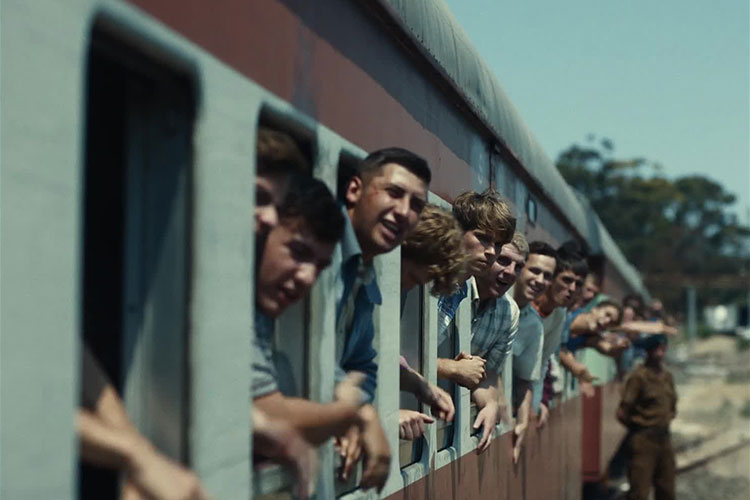The following questions and answers are excerpted from a conversation that followed the NBR screening of Moffie.
What was your experience working with the author of the memoir on which the film is based?
Oliver Hermanus: The first thing I did, when I was certain I would tackle it, was I met with [author Andre Carl van der Merwe] a few times. And he was very aware, and very comfortable, with the idea that we didn’t want him to write the script for the film. And he was very happy with us to take it and run. And we really did run! The book and the film are vastly different. What I took out of the book was the context and the setting of the apartheid machine that was indoctrinating these boys, these teenagers. And I kind of pivoted the focus to that, and reduced the love story that was quite strong and prominent in the book. I shifted it into something very subtle and quiet. But he was happy for me to do that.
what made those men the way that they are?
What did you have to learn about the period in order to make this film?
OH: On one level of course, understanding the military is just a huge challenge. Making military films is like entering another universe, there’s so much you have to learn. And this is an extinct military, so everything about it is no longer current. So there was that level of it. But then in terms of the details, the texture of conscription, and the context of the war with Angola, was all very dense and I had to read and understand it. And it’s something that was not being reported on at the time. The kind of cold-war that was going on then— what we refer to colloquially as “The Border War,” the Namibian War of Independence, the government was intentionally not reporting on it. It was kind of happening quietly. At the time, the average South African wan’t fully aware of the details. All of the details kind of came out at the end of apartheid, when we had the Truth and Reconciliation Commission, and when there was this kind of investigation into what exactly was the nature of that conflict. So that’s why most South Africans were sort of… grey on the details. The only people who really knew about this war were the men who had to serve, and who had to fight, and pretty much all of them never speak about it. So I found that to be equally fascinating. And I went to Namibia, I went to visit all the camps, I became very forensic in just getting a sense of where this all took place and what that world looked like, because I had to recreate all of that in Cape Town!
The music is such a powerful force in the film. Can you discuss your approach?
OH: I think I somehow imagined this film as an opera, if that makes any sense? So the sort of brief to the composer was, “how do we do opera without voices?” In terms of creating a score that almost felt like a soundscape, it felt like a sort of representation of the time period and of the fear. Particularly for the first twenty minutes of the film it’s actually sort of one piece of music that starts at the very first frame of the film, and kind of dips out after the first scene and then comes back as the train sequence unfolds. And we sort of saw that as the tonal spirit of the music in the film. And then to constantly be contrasting that. I constantly wanted to contrast that using the Vivaldi, and the Schubert, and then Summer Breeze… just constantly adjusting the expected tone of the film as we went. Which was risky, to say the least.
How do you think this film fits into the current conversation happening around the world regarding rights for traditionally oppressed people?
OH: The film premiered in Venice, and on the day it was first shown, at the same time, it happened to be the biggest march against gender-based violence in South African history. There had been the George Floyd murder in America… we had a similarly horrifying experiences in South Africa. A young woman was murdered in a post office, and her murder just sort of shocked the whole country, and it was this senseless killing. And it mobilized women in South Africa within a week to organize a sort of national protest. So the life of Moffie as a film, in terms of an audience seeing it, started on this day of all days, and obviously the film deals with themes (toxic masculinity, whiteness) on the same day that a march was taking place in South Africa against these exact concepts. And as the pandemic has unfolded, and as we’ve seen what’s been happening in America with Black Lives Matter, and how we’ve all been kind of sitting at home, having to acknowledge and participate in some kind of seismic change… it has been an interesting journey for Moffie, because you know, I think my fascination in wanting to make the film was always in exploring this other part of my history, which is the fact that I’ve never considered the world from the perspective of a white person who oppressed my family historically, and why they would do that, what made those men the way that they are, the way that they were. And I think we are now in a space, politically and socially around the world, where we’re having to come to the intersection of these kinds of questions.

